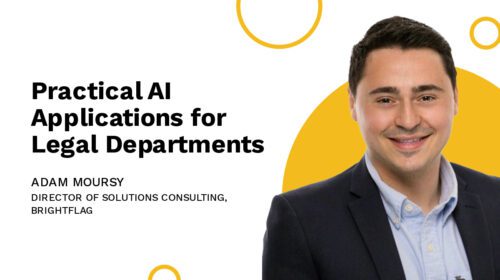How to Select the Right Legal AI Provider: A Guide to Legal AI and Tech Solutions
So you’ve done your research into the benefits of legal AI, considered your legal AI tech tool options, and decided to implement an AI tool to save time and money for your team. Now it’s time to take the final step and select your legal AI vendor.
Here’s the thing: when it comes to AI legal technology, numerous options are available. Making an informed choice requires understanding everything from implementation timelines and level of support to how their AI models are trained.
It can feel overwhelming to keep track of, but following some general principles can make the task easier. In this blog, we’ll cover everything you need to know to ensure you pick a legal AI provider that’s the perfect fit for your team.
Why Legal-Specific AI Matters
General AI vs. Legal AI Tech
There’s one thing worth clarifying up front: Whatever AI provider you choose needs to offer tools that are specialized in legal work.
The issue with general AI models, such as ChatGPT or Microsoft Copilot, is that they’ve been trained on generalized data. This means that, when it comes to legal tasks, these tools lack the specialized knowledge and context necessary to produce accurate, reliable outputs.
For example, general AI models aren’t trained on the nuances of legal terminology. So if you present a general model with a legal invoice and ask it to classify all the work featured on it, it likely won’t be able to differentiate between a motion to dismiss and a motion to compel — a potentially big issue when it comes to AI for in-house legal teams.
Specialized AI Legal Technology for Invoice Review, Compliance and Security
A specialized legal AI platform like Brightflag, on the other hand, features AI that has been built and trained over the course of a decade to classify legal work. This means it comes with accurate legal invoice review and that it can flag compliance issues according to outside counsel guidelines. It’s also designed with security in mind to protect sensitive legal data.
Legal Tech Selection Best Practices
There are several key practices to consider when evaluating legal tech solutions, which provide a strong foundation for making an informed selection. Following these recommendations will ensure you have a strong shortlist of vendors to choose from before diving into the key considerations surrounding their respective AI functionality.
Find Trusted Reviews & Recommendations
Your starting point for finding legal AI solutions that are a fit for your team is to see what current users have to say about the tool. Feedback from real users can preemptively address questions you may have or surface potential concerns that require clarification. Excellent sources for reviews of AI tools for in-house legal teams include:
- G2 reviews: Checking independent review sites like G2 is a great way to see how people feel about the tech. They can also help you identify potential concerns, such as implementation challenges or a lack of ongoing support.
- Legal professionals in your network or on LinkedIn: People in your immediate networks are another good potential source of information. If someone you know is using AI legal technology, consider reaching out to them to see how their experience has been with a particular provider. It also doesn’t hurt to learn what they would have done differently during their selection process.
- Message boards: Message boards on professional sites, such as CLOC, are another potential source of information — especially if you can find users who have similar requirements to yours.
Notably, all reviews are not created equal. So, be sure to verify the credibility of our sources.
Match Functionality to Your Needs
Every legal AI tech tool is different, and many focus on a specific set of needs. That’s why it’s essential to choose a legal AI solution that matches your department’s unique requirements.
The key question is: What do you care about most? Is it saving time? Then you’ll want to choose the tool that leverages AI to empower its automation capabilities. Is it essential to ensure easy adoption by end-users? Then, ensure that you select an AI provider with a strong reputation for excellence.
Ensure the tool helps your team align with broader business objectives and KPIs. After all, adopting AI for your in-house legal team isn’t just about improving efficiency; it should also help you prove the legal department’s business value.
Implementation and Support
Even the best legal AI solutions fall short because you can’t implement them smoothly. Ensure success by paying careful attention to:
Legal AI Implementation Timelines
Ensure you have a clear timeline from your provider outlining the typical duration of the process. Don’t hesitate to ask customers with similar-sized legal departments in your network what their implementation process was like with the vendor in question. There are many reports of implementations that dragged on for years and were never fully integrated. A good vendor will complete the task efficiently.
Support Models That Drive Success
Then, once you’re up and running, you’ll need a trusted guide to help you get the most from your AI tool. That’s where your AI provider’s support model comes into play. The best AI for in-house legal teams comes with responsive support, including a customer success manager who serves as an extension of your in-house legal team and helps you utilise your AI toolset to its fullest potential. So, Be Sure to select a provider with a strong reputation for excellent customer service.
Key Considerations When Choosing a Legal AI Provider
You now have a bird’s eye view of where the legal AI providers you’re considering stand in terms of customer satisfaction and how well they can address your legal team’s needs. However, it’s now your responsibility to examine the finer details of their legal AI tech offerings to understand better how they differentiate themselves in a few key areas.
Model Training & Configuration
Ideally, the AI you decide to onboard will work right out of the box and won’t need your team to train it. That’s the case with Brightflag.
However, some solutions will require training on your own data. If they do, you’ll want to know how long this training takes and what requirements your team needs.
For example, does the AI need to be trained on your contract data to find key terms and clauses? Knowing this information helps you establish your timeline, plan logistics, and make an informed choice about whether a specific legal AI solution is a good fit for your team.
Accuracy & Error Handling in Legal AI Tech
Next, you need to know how accurate the AI model you’re considering is — and how it handles and fixes errors.
There are certain aspects of your in-house team’s work where complete accuracy from your AI tool is vital (e.g. when drafting court documents). On the other hand, some functions — such as aggregate reporting — allow for a slightly greater margin of error.
It’s also essential to ensure that the tool is adequately trained for accuracy with legal data and that safeguards are in place to prevent critical errors. For instance, if your in-house team uses AI to review NDAs or supplier contracts, a misinterpretation of a single clause (like an indemnity or termination condition) could expose the company to serious risk.
Privacy & Data Residency
Legal information is incredibly sensitive, so your legal department requires a comprehensive understanding of where the information shared with your legal AI tool is stored and how it is used.
Typically, it’s best to ensure that your in-house team’s data will be kept on servers within your preferred jurisdiction. For example, if you are a US-headquartered company, you may want your data to be stored on servers located in the US. At the same time, you’re a European company, so you’ll prefer European data residency. And importantly, your data should not be shared with third parties but kept on the servers of your legal AI provider.
This is an area where general models like ChatGPT fall short, as they often pool all inputs entered into their system to train their model. This, in turn, creates potential privacy issues, as seen in the 2023 Samsung source code leak that originated from ChatGPT.
Data Security & Certifications
Related to the previous point, how robust is your legal AI solution’s data security? Any leaked or hacked information can have serious repercussions for you and (not to mention the business).
The best AI providers will hold internationally recognized security certifications giving your legal team peace of mind. You’ll want to ensure your vendors are, at the very least, SOC 1 Type 2 and SOC 2 Type 2 compliant, and that they have ISO/IEC 27001 certification.
AI Roadmap & Innovation Commitment
When it comes to AI for in-house legal teams, things move fast. The last thing you want to do is choose an AI vendor that can’t keep pace.
Ensure the vendor can explain their roadmap to you, and that they are focused on keeping your legal team ahead of the curve by constantly adding new features. Remember: AI is an investment, so the more a vendor prioritizes staying on the cutting edge, the greater value your legal team will receive from the product over time.
Final Checklist for Legal AI Selection
And that’s it. By this point, you’ve put a lot of time and effort into choosing your legal AI solution, and you should have a good idea of what to look for in legal AI tech to ensure it meets your team’s needs. To recap, ensure your chosen tool is:
- Explicitly designed as AI for in-house legal teams, with appropriate security, data governance and model training
- Widely regarded as a practical solution by reviewers and peers
- Supported by strong customer relations, a solid roadmap and a rapid implementation strategy
With all that in place, your team will soon reap the benefits of dedicated legal AI technology, increased efficiency, and savings, as well as a more strategic positioning for your department.
Want to cut straight to the chase with a top-notch platform? Brightflag’s AI-powered e-billing and matter management platform ticks all the above boxes and can help transform your legal department in as little as 45 days. Book a demo today and let our team walk you through the details.
Legal AI Provider FAQs
What is legal AI technology, and how is it used by in-house teams?
Legal AI solutions are AI-powered platforms and tools that help in-house legal teams to streamline workflows and reduce costs. They also provide data-driven insights into the legal team’s workflows, making it easier for legal ops and leadership to make strategic decisions about legal work.
How can legal AI solutions improve financial control?
Legal AI tools empower your team to manage their legal expenses effectively and gain a clearer understanding of them. This includes reviewing spend on outside counsel, ensuring matters are resourced efficiently, and reducing the amount of time your team spends on mundane tasks. All of which also improves the value that legal delivers to the broader business.
Is using AI in law firms secure and compliant?
If you select a dedicated AI legal technology tool, then yes. Tools that aren’t explicitly designed for in-house legal teams, however, can compromise sensitive data, so it’s essential to select a tool with data security and certifications that your team can trust.
How can I calculate the ROI of implementing legal AI technology?
Reasonable legal AI solutions will make it easy for your team to calculate and prove ROI. Look for vendors that can clearly demonstrate value and provide rapid implementation, enabling you to achieve a faster ROI.



